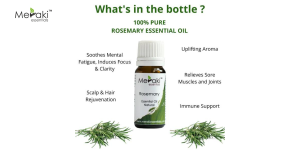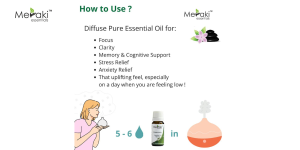Rosemary Essential Oil: Versatile Vitality
Rosemary Essential Oil emerges as a multifaceted marvel. Its revered prowess nurtures luxuriant tresses, stimulating growth while nourishing the scalp’s well-being. Transcending its trichological talents, this aromatic elixir invigorates the mind, sharpening focus and alleviating mental fatigue with its invigorating scent.
Beyond its cerebral effects, Rosemary Oil soothes the body, offering respite to aching muscles and joints while promoting robust circulation. When diffused, it becomes a respiratory ally, supporting healthy breathing.
Rosemary Essential Oil’s Origins and Undiscovered Virtues
The story of rosemary essential oil begins in the sun-drenched Mediterranean region, where the fragrant rosemary shrub has thrived for centuries. It is believed to have been first extracted and used by ancient Greek scholars, who were drawn to its invigorating aroma. They quickly discovered that this potent oil could enhance focus, memory, and mental clarity – making it the perfect companion for their pursuits of knowledge and philosophy.
As word spread of rosemary’s cognitive benefits, it piqued the interest of the Romans as well. They began using the oil for religious rituals and ceremonies, burning it to purify the air and promote spiritual well-being. Brides would even have rosemary woven into their hair garlands as a symbol of fidelity.
However, the true virtues of rosemary oil extended far beyond just boosting brain power and cleansing the spirit. Though they went largely undiscovered for many centuries, this botanical treasure trove offered an array of hidden benefits for full-body health.
One of rosemary’s best-kept secrets was its ability to stimulate hair growth and prevent balding. By increasing circulation to the scalp, the oil helps deliver vital nutrients to hair follicles while reducing inflammation. Ancient civilizations likely had no idea their sacred herb was actually a hair-rejuvenating powerhouse!
Another underappreciated aspect was rosemary’s anti-inflammatory and analgesic properties. The oil’s natural compounds like 1,8-cineole can help soothe sore muscles, joints, and even relieve headaches when applied topically. No wonder Roman soldiers found themselves re-energized after rosemary baths.
Even today, we are still uncovering rosemary oil’s therapeutic potential – from promoting respiratory health to balancing hormones. Its rich antioxidants continue to astound modern scientists. Though ancient peoples treasured it, they likely only scratched the surface of the botanical’s true capabilities.
Rosemary Essential Oil: A Multifaceted Powerhouse for Mind, Body, and Home
Rosemary essential oil derives its potent therapeutic properties from a complex blend of bioactive compounds. The primary constituents responsible for its diverse benefits include:
α-Pinene: This monoterpene exhibits anti-inflammatory, antiseptic, expectorant, and bronchodilator effects. It helps reduce inflammation, fight infections, and promote respiratory health.
Camphor: A naturally occurring terpenoid, camphor acts as a cough suppressant, decongestant, febrifuge (fever reducer), anesthetic, antimicrobial, and anti-inflammatory agent. It can alleviate coughs, congestion, pain, and swelling.
1,8-Cineole (Eucalyptol): Renowned for its analgesic, antibacterial, antifungal, anti-inflammatory, antispasmodic, antiviral, and cough suppressant properties, this oxide monoterpene offers a wide range of therapeutic applications.
Camphene: A bicyclic monoterpene with antioxidant, soothing, and anti-inflammatory qualities, camphene contributes to rosemary oil’s ability to combat oxidative stress and reduce inflammation.
Limonene: This cyclic monoterpene acts as a nervous system stimulant, psychostimulant, mood-balancer, appetite suppressant, and detoxifying agent. It can uplift mood, boost cognitive function, and support the body’s detoxification processes.
Linalool: Exhibiting sedative, anti-inflammatory, anti-anxiety, and analgesic properties, linalool helps promote relaxation, alleviate anxiety, reduce inflammation, and manage pain.
Uses of Rosemary Essential Oil
Rosemary essential oil boasts a rich chemical makeup, with key components like alpha-pinene, camphor, and cineole contributing to its diverse benefits.
Enhancing Mental Clarity and Well-being:
- In aromatherapy, rosemary oil’s invigorating scent combats stress and anxiety, promoting mental alertness and focus.Boosting productivity and wellbeing at workplace
- Studies suggest it can improve memory retention and mood, making it a valuable tool for cognitive support.
Promoting Respiratory Health:
- Rosemary oil’s decongestant properties help clear airways, easing coughs and congestion.
- Its stimulating effect may boost the immune system, offering further protection against respiratory ailments.
Soothing the Body:
- When applied topically (diluted!), rosemary oil offers pain relief for muscle aches and headaches.
- Its anti-inflammatory properties can soothe irritated skin and may even aid digestion.
Nourishing Hair and Skin:
- Rosemary oil’s stimulating properties are renowned for promoting hair growth and strengthening hair follicles.
- It can also moisturise the scalp and combat dandruff.
- For skin, rosemary oil’s versatility shines. Its antibacterial and antiseptic properties make it ideal for various skin conditions, while its antioxidant properties promote a healthy glow.
Freshening Your Surroundings:
- The refreshing aroma of rosemary oil is a natural deodorizer, eliminating unpleasant odours in your home.
- You can incorporate it into DIY room fresheners or scented candles.
Rosemary Essential Oil Properties:
- Cosmetic: Stimulating, analgesic, anti-inflammatory, antiseptic, antifungal, antibacterial, astringent, disinfectant, antioxidant.
- Odorous: Anti-stress, cognition-enhancing, mood-lifting, stimulating, decongestant.
- Medicinal: Antibacterial, antifungal, detoxifying, analgesic, anti-inflammatory, carminative, laxative, decongestant, antiseptic, disinfectant, anti-nociceptive.
Rosemary oil’s versatility shines through its myriad applications across the realms of wellness, aromatherapy, and natural home solutions. This evergreen essence offers a cornucopia of uses that can be harnessed through various forms, from oils and gels to lotions, soaps, shampoos, and sprays – inviting seamless integration into daily rituals.
In the realm of aromatherapy, rosemary’s woody, herbaceous scent promotes relaxation while simultaneously boosting alertness and cognitive function. Diffusing its aroma for controlled periods can alleviate stress and improve memory retention, making it an invaluable ally for students and professionals alike.
When diluted with a carrier oil for topical application, rosemary oil’s detoxifying and analgesic properties come to the fore. Massaging it into lymph nodes can stimulate the body’s waste elimination processes and soothe digestive discomforts. Its anti-inflammatory virtues also make it an ideal remedy for muscle aches and pains, especially when blended with complementary oils like peppermint.
Beyond its therapeutic uses, rosemary oil’s antimicrobial and antiseptic qualities lend themselves to natural home cleaning solutions. A simple blend of rosemary oil, vinegar, and water creates a potent multipurpose cleansing spray, harnessing nature’s power to purify indoor environments and eradicate harmful bacteria.
From cognitive enhancement to pain relief, digestive support to eco-friendly cleaning, rosemary oil’s versatility knows no bounds, offering a bounty of natural solutions for holistic well-being.
How to Use Rosemary Essential oil
Rosemary essential oil offers a variety of benefits, but it’s important to use it safely and effectively. Here’s a breakdown of how to use rosemary essential oil for different purposes:
Aromatherapy:
- Diffusion: Add 3-4 drops of rosemary oil to a diffuser with water. Diffuse for a maximum of 30 minutes at a time. Breathe deeply to enjoy the invigorating aroma.
Topical Application (Always dilute!):
- Massage: Dilute 2-3 drops of rosemary oil with 1 tablespoon of carrier oil (like jojoba, coconut, or almond oil). Massage the diluted oil onto sore muscles, aching joints, or scalp.
- Haircare & Skincare: Blend 25 – 35 drops of an essential oil with 50 ml of carrier oil & massage gently on skin and hair.
Important Safety Reminders:
- Never use rosemary oil undiluted on your skin. It can cause irritation.
- Perform a patch test before widespread use. Apply a diluted drop to your inner elbow and wait 24 hours to check for any reactions.
- Consult a healthcare professional before using rosemary oil if you are pregnant, nursing, or have any medical conditions.
- Keep rosemary oil out of reach of children and pets.
By following these guidelines, you can safely enjoy the many benefits of Meraki Essentials rosemary essential oil. Remember, it’s best to start with a lower dilution and increase gradually if needed. Rosemary oil’s natural gifts demand responsible use. For external applications only. Store rosemary oil safely away from children. Consult a doctor before use if pregnant, nursing, or under medical care. Avoid contact with eyes and sensitive areas. Discontinue use of rosemary oil immediately if irritation occurs.
FREQUENTLY ASKED QUESTIONS
Q: I heard rosemary oil can help with memory. Is that true?
There is some evidence to support this! Studies suggest that inhaling rosemary oil may help prevent the breakdown of acetylcholine, a brain chemical important for memory and focus.
Q: My muscles are sore after a workout. Can rosemary oil help?
Rosemary oil may be worth a try! Research suggests that rosemary oil aromatherapy may be more effective than acupressure alone in reducing shoulder pain.
Q: I’m looking for natural ways to improve my skin. Can rosemary oil help?
Rosemary oil has several potential benefits for the skin. Its antibacterial and astringent properties may help combat acne and control excess oil. Additionally, its anti-inflammatory effects may soothe irritated skin.
Q: I’m feeling stressed. Can rosemary oil help me relax?
The stimulating aroma of rosemary oil may be more uplifting than calming. However, some studies suggest it may help reduce stress and anxiety by lowering cortisol levels (stress hormone). You might find it helpful to combine rosemary oil with a more relaxing essential oil, like lavender, to create a calming blend.








Leave A Comment